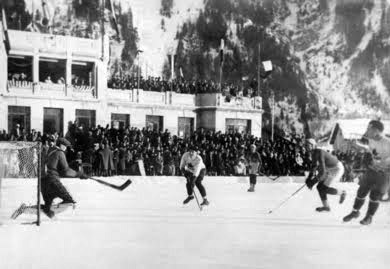
The first Olympics to be held outside Europe were opened at Lake Placid by then Governor of New York Franklin Delano Roosevelt, the future president of the United States. Despite the Great Depression, the Americans spent extravagantly on a new stadium and other facilities, including a bobsleigh track.
These Games marked a strong improvement by Canadian athletes, as they came away with seven medals. The organizers dramatically altered the rules for speed skating, using North American pack-style racing instead of competing against the clock. This greatly benefited North American skaters, who won 10 of 12 medals in the sport. The great champion Clas Thunberg of Finland refused to even make the trip. (Pack-style skating was dropped from the Olympics after the 1932 Games.) Three Canadian speed skaters won a total of five medals, including silver and bronze in the 1500m.

For the first time, women’s speed skating was included as a demonstration sport at the Olympic Winter Games. Canadian Jean Wilson won the 500m race and came a close second in the 1500m. (Sadly, shortly after the Games, Wilson was diagnosed with myasthenia gravis, an autoimmune neuromuscular disease, and died in 1933 at only 23 years of age.) Fellow Canadian speed skater, Lela Brooks (the “Queen of the Blades”) also competed at the Games. Although the events were a success, women’s speed skating did not become an official Olympic sport until 1960.

In men’s figure skating, Montgomery Wilson took bronze, becoming the first Canadian — and the first North American male — to win an Olympic medal in the sport. In women’s figure skating, Norwegian skater Sonja Henie defended her title, while Canadian Constance Wilson (Montgomery Wilson’s sister) finished fourth.

For the first time in the history of the Olympic Games, sled-dog racing was included in the schedule of demonstration events (Canada and the United States competed).
Only four teams competed in ice hockey: Canada, the United States, Poland and Germany. The Winnipeg Hockey Club represented Canada. The Americans proved to be tough opponents and were ahead deep into the third period of the deciding game until Romeo Rivers scored the tying goal. At the end of the third overtime the officials called a halt to the game and awarded the gold to Canada on the basis of a previous narrow victory over the Americans.

Canadian Team: 42 athletes (38 men, 4 women)
Canada's Rank (Overall Medal Count): 3rd (7 medals: 1 gold, 1 silver, 5 bronze)
Canadian Medallists at the 1932 Olympic Winter Games
| Athletes | Event | Medal |
|
Winnipeg Hockey Club: William Cockburn Clifford Crowley Albert Duncanson George Garbutt Roy Hinkel Victor Lindquist Norman Malloy Walter Monson Kenneth Moore Romeo Rivers Harold Simpson Hugh Sutherland Stanley Wagner Alston Wise |
Ice hockey (men) | Gold |
| Alexander Hurd | 1500m long track speed skating (men) | Silver |
| William Logan | 1500m long track speed skating (men) | Bronze |
| William Logan | 5,000m long track speed skating (men) | Bronze |
| Alexander Hurd | 500m long track speed skating (men) | Bronze |
| Frank Stack | 10,000m long track speed skating (men) | Bronze |
| Montgomery Wilson | Figure skating (men) | Bronze |

 Share on Facebook
Share on Facebook Share on X
Share on X Share by Email
Share by Email Share on Google Classroom
Share on Google Classroom


